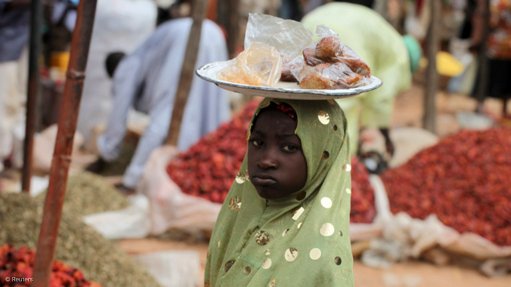Safeguarding South Africa’s water resources for future generations
This article has been supplied as a media statement and is not written by Creamer Media. It may be available only for a limited time on this website.
By Thembakazi Ndamase, Marketing Director, Sodastream South Africa
Receiving just half of the world’s average rainfall each year, there is no question that water in South Africa is a scarce resource. The country is rated as the 30th driest country in the world. Exacerbating the problem of water scarcity is a growing population which has resulted in increased demand for water services. The challenge, however, is that demand for water services exceeds the pace at which water infrastructure is maintained and developed.
A government-initiated study of 905 towns, the All Towns Reconciliation Strategies study, found that 28% of towns – excluding metros and large cities – have inadequate water resources. Around the country a failure to maintain water infrastructure at municipal level is having a negative impact with reports of sewage leaking into water sources, poorly maintained water purification plants and water cuts. Indications are that around 33% of the country’s safe drinking water is lost due to leakages in aging infrastructure.
Experts predict that unless serious interventions are implemented, South Africa will be faced with a 17% gap between water supply and demand by 2030.
In the past year a crippling drought in the Eastern Cape, coupled with poor water resource management, has left many towns without water. A decade long drought has had a devastating impact on agriculture and communities in the Northern Cape, Western Cape, Free State and Mpumalanga.
Like energy, water is an economic enabler. The absence of a reliable source of potable water not only has a devastating impact on communities, but also on businesses. Last year the water related challenges faced by poultry producer Astral Foods were well publicised. The company’s chicken facility in the Lekwa municipality was faced with water supply issues resulting in significant financial losses which in turn lead to job losses.
Many South Africans don’t have access to safe drinking water with a number of communities around the country living in distressed municipalities where they are reliant on unsafe or intermittent water supplies.
In late November 2019 Minister of Human Settlements, Water and Sanitation, Lindiwe Sisulu released the much anticipated National Water and Sanitation Master Plan, an ambitious plan to put South Africa back on track to achieve sustainable water security.
In her speech launching the plan, the minister said, “Our water security can only be guaranteed by a combination of a great game plan, smart technology and know-how, superb human capital in the water and sanitation sector, great research and information systems, a sound legislative and policy environment, a highly functional and co-ordinated institutional ecosystem and, most of all, a water wise South Africa.”
In a December 2019 newsletter President Cyril Ramaphosa said at least R126 billion was needed to fund water infrastructure if the country hoped to ensure its future water security. Pointing out that South Africa is a severely water stressed country, he wrote that water conservation is everyone’s responsibility. “Domestic users must use water more sparingly and reduce their consumption. Municipalities must invest in water recycling technologies that save both water and money. Industrial users must implement measures towards use efficiency,” he wrote.
Water expert Mike Muller, visiting adjunct professor at the University of the Witwatersrand, suggests that there is a “disturbing level of ignorance about how water is made available and what needs to be done to ensure adequate and reliable supplies” in the future. Key, he adds, is for the country to understand and manage what the country has.
Encouragingly, government is currently reviewing its policy on single-use plastics such as plastic straws, earbuds and plastic stirrers. Many single-use plastic items are not easily recycled and pose a serious threat to the environment.
The City of Cape Town recently became a supporting member of the South African Plastics Pact as part of its efforts to resolve the global pollution crisis caused by the use of single-use plastic. The South African Plastics Pact is part of the Ellen MacArthur Foundation’s global Plastic Pact Network which aims to change the way plastic products and packaging are designed, used and reused in an effort to eliminate the crisis the world faced in terms of environmental plastic pollution.
Acknowledging the need for plastic in the economy, the City of Cape Town has called for a circular economy for plastics which keeps it out of the natural environment.
South Africa needs to think creatively when it comes to solutions which safeguard our natural resources for future generations. Future water sustainability relies on a number of issues including better management of the country’s water’s resources and water infrastructure, reducing use and reducing pollution of single-use plastics in the country’s waterways, including recycling plastics.
Comments
Announcements
What's On
Subscribe to improve your user experience...
Option 1 (equivalent of R125 a month):
Receive a weekly copy of Creamer Media's Engineering News & Mining Weekly magazine
(print copy for those in South Africa and e-magazine for those outside of South Africa)
Receive daily email newsletters
Access to full search results
Access archive of magazine back copies
Access to Projects in Progress
Access to ONE Research Report of your choice in PDF format
Option 2 (equivalent of R375 a month):
All benefits from Option 1
PLUS
Access to Creamer Media's Research Channel Africa for ALL Research Reports, in PDF format, on various industrial and mining sectors
including Electricity; Water; Energy Transition; Hydrogen; Roads, Rail and Ports; Coal; Gold; Platinum; Battery Metals; etc.
Already a subscriber?
Forgotten your password?
Receive weekly copy of Creamer Media's Engineering News & Mining Weekly magazine (print copy for those in South Africa and e-magazine for those outside of South Africa)
➕
Recieve daily email newsletters
➕
Access to full search results
➕
Access archive of magazine back copies
➕
Access to Projects in Progress
➕
Access to ONE Research Report of your choice in PDF format
RESEARCH CHANNEL AFRICA
R4500 (equivalent of R375 a month)
SUBSCRIBEAll benefits from Option 1
➕
Access to Creamer Media's Research Channel Africa for ALL Research Reports on various industrial and mining sectors, in PDF format, including on:
Electricity
➕
Water
➕
Energy Transition
➕
Hydrogen
➕
Roads, Rail and Ports
➕
Coal
➕
Gold
➕
Platinum
➕
Battery Metals
➕
etc.
Receive all benefits from Option 1 or Option 2 delivered to numerous people at your company
➕
Multiple User names and Passwords for simultaneous log-ins
➕
Intranet integration access to all in your organisation


















